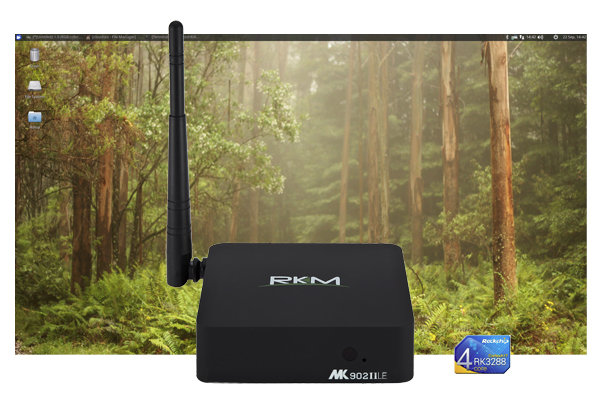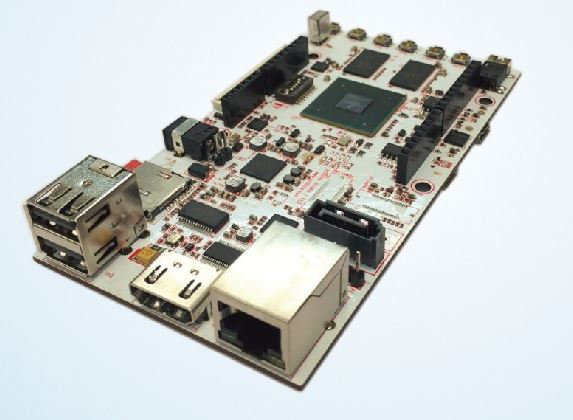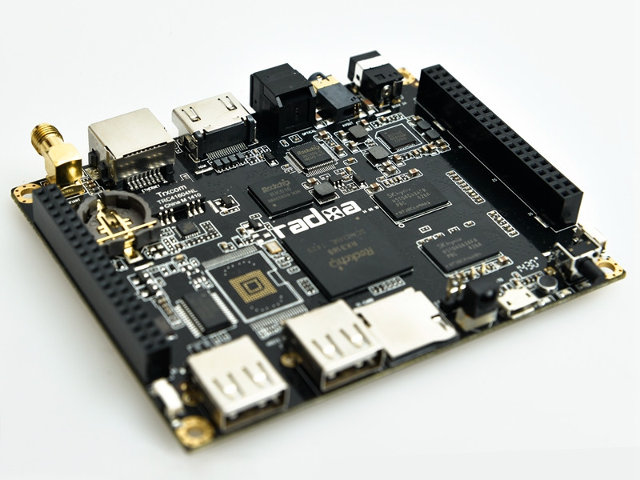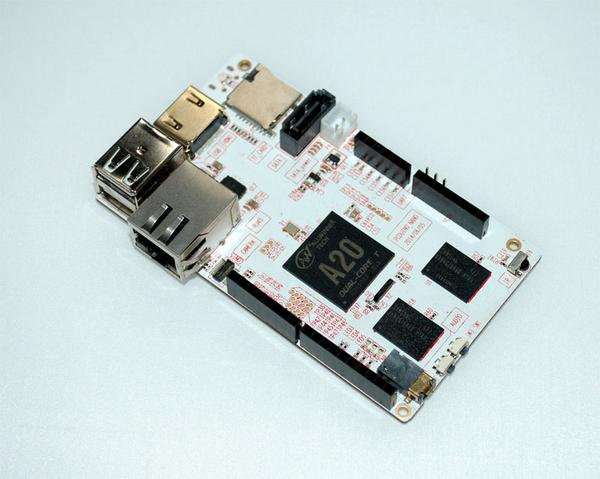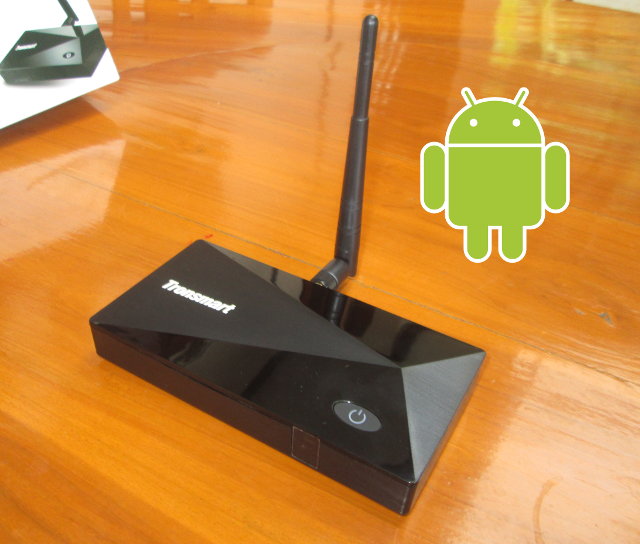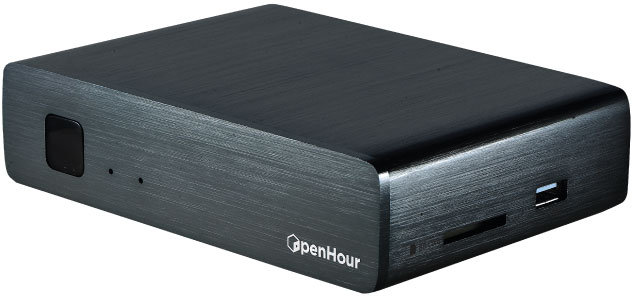Linaro 14.09 has just been released with Linux kernel 3.17-rc4 (baseline), Linux 3.10.54 & 3.14.19 (LSK), and Android 4.4.2 & 4.4.4. Linaro has kept working on their member boards such as IFC6410 (Qualcomm), D01 (Huawei/Hisilicon), Ardnale (Samsung), and Juno (ARM). They’ve also announced they’ll change the tools to build GCC by using cbuild2 instead of cbuild1 for next release, and they’ve enabled a build with gcov (for code coverage analysis) which may mean they’ll work on reducing the kernel size by getting rid off unused code. I’ve also noticed the Arndale and Arndale Octa Ubuntu images are now based on Linux LSK with Mali GPU support since last month. Here are the highlights of this release: Linux Linaro 3.17-rc4-2014.09 GATOR version 5.19 updated topic from Qualcomm LT (ifc6410 board support) and HiSilicon LT updated Versatile Express ARM64 support (FVP Base and Foundation models, Juno) from ARM LT. updated Versatile Express […]
Rikomagic Announces MK902II LE Ubuntu Mini PC Powered by Rockchip RK3288 SoC
Rikomagic announced their MK902II mini PC based on Rockchip RK3288 in May, and which has started shipping recently for about $130. The company have now announced MK902II LE (Linux Edition) based on the same hardware, but instead of running Android 4.4, it’s running Xubuntu 14.04 with some virtualization technique that allows it to run x86 Linux programs such as Skype, and it can even support Wine to run Windows programs. MK902II LE specifications: SoC – Rockchip RK3288 Quad Core Cortex A12/A17 up to 1.8GHz with ARM Mali-T764 GPU supporting OpenGL ES1.1/2.0/3.0, Open VG1.1, OpenCL, DirectX11 System Memory – 2GB (Dual channel 64 bit DRAM controller) Storage – 16GB Internal eMMC with Xubuntu 14.04 preinstalled + micro SD card slot Video Output- HDMI (1080p), and AV output Audio Output – HDMI, AV output, optical output, or external USB audio card (not included) Connectivity – Gigabit Ethernet, 802.11 b/g/n Wi-Fi. USB – […]
pcDuino Acadia 1 is a Freescale i.MX6 Quad Development Board with Arduino Headers
Linksprite has been pretty busy recently. After announcing the $39 pcDuino3 Nano, they’ve now unveiled a new board named pcDuino Acadia 1 powered by Freescale i.MX6 Quad processor with 1GB RAM, 8GB eMMC, a few common ports, and Arduino headers in order to connect Arduino shields to their Linux/Android board. pcDuino Acadia 1 (preliminary) specifications: SoC – Freescale i.MX6 Quad with four ARM Cortex A9 cores up to 1.2GHz, and Vivante GC2000 GPU with support for OpenGL/ES 2. x, OpenCL EP support, and OpenVG 1.1. System Memory – 1GB DRAM Storage – 8GB eMMC, 2x micro SD card slots (up to 128GB), and SATA Video Output – HDMI 1.4 with HDCP support, LVDS Audio Output – 3.5mm analog audio interface Camera – 1x MIPI, 1x CSI Connectivity – 10/100/1000Mbps Ethernet (limited to 470Mbps) USB – 2x USB 2.0 host ports, 1x micro USB OTG Expansion Headers – Arduino UNO compatible […]
The New Radxa Rock Lite Rockchip RK3188 Development Board Sells for $59
You may have heard about Radxa Rock Lite development board before, so let’s clear up the different versions of the Radxa Rock first. There’s a total of four Radxa Rock models: Radxa Rock (2013) – The original version with 2GB RAM, 8GB NAND Flash, and Wi-Fi/Bluetooth Radxa Rock Lite (2013) – 1GB RAM, 4GB NAND Flash, and Wi-Fi only Radxa Rock Pro (2014) – An evolution of the Radxa Rock still with 2GB RAM, 8GB NAND flash, Wi-Fi/Bluetooth but adding LVDS and camera interfaces. Radxa Rock Lite (2014) – 1GB RAM, no NAND flash, and Wi-Fi only The fist two versions appear to have been phased out, as they are not listed for sale on Radxa Rock website, and today, I’ll write about Radxa Rock Lite (2014). Radxa Rock Lite (2014) specifications: SoC – Rockchip RK3188 ARM Cortex-A9 quad core @ 1.6Ghz + Mali-400 MP4 GPU System Memory – 1GB […]
$39 PcDuino3 Nano ARM Linux Development Board Features HDMI, SATA, Gigabit Ethernet, Arduino Headers…
Linksprite recently announced PcDuino3 Nano development board powered by AllWinner A20 dual core processor. PcDuino3 Nano is, as you can expect, a smaller and cheaper version the company’s PcDuino3 board without Wi-Fi module, LVDS header, and I2S interface. The board does not appear to support Li-Po batteries either, but it adds one extra USB host port compared to its big brother. pcDuino3 Nano specifications: SoC – AllWinner A20 dual core ARM Cortex A7 @ 1.0 GHz with Mali 400MP2 GPU System Memory – 1GB DRAM Storage – 4GB NAND Flash, SATA connector, and microSD card slot (up to 32GB) Video Output – HDMI 1.4 with HDCP support Audio Out – 3.5mm analog audio interface Connectivity – Gigabit Ethernet USB – 2x USB host, 1x USB OTG Expansion Headers – Arduino UNO extension interface with 14xGPIO, 2xPWM, 6xADC, 1xUART, 1xSPI, 1xI2C. Camera – MIPI camera support Misc – IR receiver Power […]
How to Build Android 4.4 for Rockchip RK3288 Devices (Tronsmart Orion R28)
After blowing up my ATX power supply, and learning such things as “FULL” power supplies do exists, I finally managed to build Android for Tronsmart Orion R28 using the provided SDK. I haven’t tried to load it on the device yet, but the build could complete successfully after following the steps below in Ubuntu 14.04. The SDK is probably not specific to one device, so it might just also work on other RK3288 TV boxes and tablets. First download Android 4.4 SDK for RK3288, or use the one in the micro SD card provided with the Beta version of R28 Pro and Meta. Install some dependencies:
|
1 2 3 4 5 |
sudo apt-get install git-core gnupg flex bison gperf libsdl1.2-dev libesd0-dev libwxgtk2.8-dev \ squashfs-tools build-essential zip curl libncurses5-dev zlib1g-dev pngcrush schedtool libxml2 \ libxml2-utils xsltproc lzop libc6-dev schedtool g++-multilib lib32z1-dev lib32ncurses5-dev \ lib32readline-gplv2-dev gcc-multilib libswitch-perl gcc-arm-linux-gnueabi lzop libncurses5-dev \ libssl1.0.0 libssl-dev |
Extract the SDK:
|
1 |
tar xvf Orion_R28_SDK_doc.tar.gz |
And build the kernel first: Enter the kernel directory:
|
1 |
cd RK3288_R-BOX_ANDROID4.4.2-SDK_V1.0.0/kernel/ |
Change arch/arm/boot/dts/Makefile to use RK3288 device tree file instead of an RK3188 (may not be needed, but the build failed for me without that change…):
|
1 |
dtb-$(CONFIG_ARCH_ROCKCHIP) += rk3288-box.dtb |
It’s also quite […]
Cloud Media OpenHour Chameleon Quad Core TV Box Boots Android or Linux from SD Card
Cloud Media, previously known as Syabas, has been selling Popcorn Hour media players based on Linux for several years, but with OpenHour Chameleon the company is about to launch their first Android media player powered by Rockchip RK3288. The device is similar to other RK3288 TV boxes, except it does not come with internal storage at all, and instead boots Android 4.4.2 from a provided 8GB SD card, with later plans to have support for Linux operating systems such as Ubuntu. Another particularity is that they’ll use an aluminum casing for better heat dissipation of the Rockchip RK3288 processor which can get pretty hot… OpenHour Chameleon specifications: SoC – Rockchip RK3288 quad core ARM Cortex A12 / A17 processor with ARM Mali-T764 quad-core 3D GPU supporting OpenGL ES 1.1/2.0/3.0, and OpenCL 1.1 System Memory – 2GB DDR3 Storage – No Internal storage + SD card slot with 8GB card (including […]
Linaro 14.08 Release with Kernel 3.16 and Android 4.4.4
I’m a little late for that one, as Linaro 14.08 was released last Thursday. Nevertheless, this release features Linux kernel 3.16 (baseline), Linux 3.10.52 (LSK), and Android 4.4.4. As usual Linaro has worked on member hardware such as Qualcomm based IFC6410 and ARM Juno &Vexpress boards. They’ve also committed changes for LLVM, big Endian, and added a workload generator tool (rt-app) to the Ubuntu and Android image. This tool has been developed and used by the power management working group, presumably to measure and optimize power consumption under various loads. Here are the highlights of this release: Linux Linaro 3.16-2014.08 GATOR version 5.19 (new version) updated topic from Qualcomm LT (ifc6410 board support) updated Versatile Express ARM64 support (FVP Base and Foundation models, Juno) from ARM LT (Landing Team) updated Versatile Express patches from ARM LT updated LLVM topic (follows the community llvmlinux-latest branch) Big endian support (the 2014.05 topic […]



